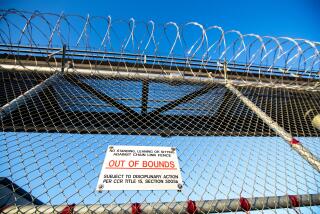Detainees Told FBI of Koran Desecration
- Share via
WASHINGTON — Prisoners at the Guantanamo Bay, Cuba, detention facility told FBI interviewers in 2002 and 2003 that guards repeatedly desecrated the Koran, and that perceived abuses of the Muslim holy book triggered unrest at the prison as well as possible suicide attempts, government documents showed Wednesday.
The allegations include an incident in which guards “flushed a Koran in the toilet,” FBI documents show. In another incident, a detainee refused to cooperate with investigators because of an interrogator allegedly “humiliating the Koran” while questioning another inmate.
The documents -- the latest to be released as part of a lawsuit by the American Civil Liberties Union seeking to shed light on U.S. treatment of detainees in Cuba -- parallel allegations of Koran desecration by prisoners in civil lawsuits against U.S. authorities and in interviews with the Los Angeles Times and other news organizations.
No independent verification has been made of the prisoners’ claims. The FBI reports say that some prisoners, when asked, were not able to say that they had witnessed such abuse of the Koran, but that they had heard rumors about it.
One prisoner, the FBI notes say, “considers it his duty as a Muslim to believe the rumor until it is proven untrue.”
ACLU officials said the documents showed that U.S. officials failed to take seriously allegations that guards were desecrating the Koran when the claims surfaced.
“The United States government’s own documents show that it has known of numerous allegations of Koran desecration for a significant period of time,” said Amrit Singh, an ACLU lawyer.
However, the Army instituted elaborate procedures to ensure sensitive treatment of the Koran at the Guantanamo Bay facility two years ago. Some prisoners told FBI interviewers that conditions had since improved.
The latest government documents came as Amnesty International, the human rights group based in London, in its annual report called the prison camp at Guantanamo “the gulag of our time” and urged Washington to shut it down.
Irene Khan, Amnesty’s secretary general, accused the United States of shirking its responsibility to set the standard for human rights protections.
White House spokesman Scott McClellan said Amnesty’s complaints were “ridiculous and unsupported by the facts.” He said allegations of prisoner mistreatment were investigated. “We hold people accountable when there’s abuse,” he said. “We take steps to prevent it from happening again.”
The Pentagon is conducting an internal investigation of reported abuses at the prison camp, but has declined to say what it has found.
The issue of desecration of the Koran flared this month after Newsweek magazine reported that U.S. investigators had confirmed an incident in which a Koran was flushed down a toilet at the prison, and that the incident was going to be included in an upcoming government report.
The article -- which Newsweek subsequently retracted -- was blamed for deadly rioting in the Muslim world.
The Pentagon said the documents did not include any new allegations, and that it had been aware of the allegation concerning the Koran and the toilet but was never able to corroborate it.
It said the source for that allegation was an “enemy combatant,” whom it did not identify, and that the combatant was later reinterviewed about the allegation as part of an ongoing inquiry into possible Koran mishandling.
“We still have found no credible allegations that a Koran was flushed down a toilet at Guantanamo,” Bryan Whitman, deputy Pentagon spokesman, said in a statement issued Wednesday night.
The new documents included notes from a July 29, 2002, interview in which a detainee complained of ill treatment and beatings by guards.
“They flushed a Koran in the toilet,” the detainee alleged, according to the report. “The guards dance around when the detainees are trying to pray. The guards still do these things.”
The document did not elaborate, but other summaries of FBI interviews that were released showed that prisoner complaints about mistreatment of the Koran occurred with some regularity. They included allegations that guards threw the holy book on cell floors, or improperly touched it during searches.
Others complained that guards would take away the Koran as punishment for failing to cooperate with investigators.
One prisoner said a guard’s dropping of the Koran led to an “uprising” at the prison in July 2002.
But the FBI notes assert that in actuality the detainee dropped the holy book and then blamed the guard.
Other prisoners believed that issues regarding the Koran led a fellow inmate to attempt suicide in January 2003, the notes of one interview showed.
“It was just a matter of time before something like this occurred,” the detainee said, according to the FBI notes.
“The guards need to be made aware of how they are humiliating the Koran.”
More to Read
Sign up for Essential California
The most important California stories and recommendations in your inbox every morning.
You may occasionally receive promotional content from the Los Angeles Times.










